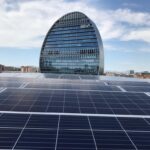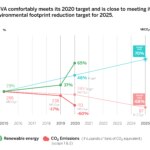BBVA meets goal to become carbon neutral in 2020
BBVA became carbon neutral in direct CO2 emissions in 2020. The Group managed to meet this goal by offsetting its entire carbon footprint through carbon mitigation projects, which also benefited the local communities where they are developed. The bank offset 120,562 tons of CO2e during the year through seven projects developed in different countries across its footprint. This achievement represents another step towards in its push to align its activity with the Paris Agreement and reduce direct and indirect emissions.

BBVA accomplished all the targets defined in its Global Eco-efficiency Plan 2016-2020, after making substantial environmental footprint improvements, compared to 2019. The bank currently sources 65 percent of its energy needs from renewables, far exceeding the 48 percent target set for 2020.
Also, the bank cut its carbon emissions by 58 percent —as per the 'market based' method (1)—, electricity consumption by 9 percent, water consumption by 6 percent and paper consumption by 42 percent (all of them per person). In addition, the percentage of people who work at environmentally certified buildings jumped to 48 percent.
The Global Eco-efficiency Plan and its lines of action
Banks, due to the nature of their activity, are relatively small direct carbon polluters compared to other sectors. However, BBVA is striving to reduce the environmental impact of its activity as part of its broader strategy to fight climate change and promote sustainable development.
Through the Global Eco-efficiency Plan (PGE), and in line with the climate targets defined in its Pledge 2025, the bank continued to work in 2020 on reducing its carbon footprint and curbing the direct environmental impacts of its activity. The plan's strategy focuses on three key areas: direct impact reduction, employee awareness and carbon footprint offsetting. To materialize its commitment, the bank has defined a series of lines of action, namely:
Energy and climate change
For BBVA, reducing in-house consumption and its related impacts is a priority. In Spain and Portugal, the Group also covers 100 percent of its energy needs with renewable power sources; in Mexico, the United States, Argentina, Colombia, Peru and Turkey renewables already represent a substantial percentage, with renewables accounting for about 65 percent of the Groups’ total energy bill.
In addition, Turkey, Uruguay and Spain the Group has equipped its corporate buildings with renewable self-consumption systems (photovoltaic and solar thermal panels).
The carbon footprint is an indicator that measures an organization’s total greenhouse gas (GHG) atmospheric emissions. It is measured in tons of CO2 equivalent (CO2e). Emissions are measured following a globally accepted standard methodology (GHG Protocol), which establishes three scopes. These were BBVA's emissions in 2020:
- Scope 1 emissions are direct GHG emissions resulting from the use of fossil fuels by the reporting organization (diesel oil, natural gas, etc): 12,467 Tons of CO2e
- Scope 2 emissions are emitted by the companies generating the power consumed by the company: 100.589 Tons of CO2e . In the case of renewable energies, emissions are zero.
- Scope 3, includes indirect emissions not recognized in scope 2. In this scope, BBVA considers the kilometers traveled by employees in business trips: 7,506 Tons of CO2e.
Besides the goals defined in its 'Pledge 2025', in 2020 BBVA rolled out an internal pricing system for in-house CO2 emissions. In this regard, the bank will offset the 120,562 CO2e tons it emitted by investing in seven projects in different countries, certified under international renowned standards, including VCS of Verra, Gold Standard and CDM of UNFCCC:
- Edincik project wind project (Balikesir, Turkey),
- Project of landfill methane capture (Durango, Mexico),
- Landfill gas management and disposal project (El Verde, León, Mexico),
- Fresh Breeze reforestation project (Tabasco, Nayarit and Chiapas states, Mexico) ,
- Wind project (Oaxaca, Mexico),
- Taquesi River hydroelectric project (Bolivia), Peralta I wind project (Uruguay),
- Environmental management and sustainable construction.
Environmental management and sustainable construction
BBVA renewed and expanded in 2020 the certifications of its Environmental Management Systems in Argentina, Colombia, Spain, Peru, Uruguay , Mexico and Turkey as per the ISO 14.001 standard. A total of 80 buildings and 1,034 branches have earned this certification. Likewise, 21 buildings and 10 branch offices achieved LEED sustainable construction certification, including the bank’s flagship corporate buildings in Spain, Mexico, the United States, Argentina and Turkey. Furthermore, four of these buildings have received the highest certification category, LEED Platinum, an achievement that attests to BBVA's determination to observe the strictest environmental and energy standards in its real estate endeavors.
Water, paper and waste management
Water — one of the resources on which pollution has a greater impact — is another priority indicator for BBVA. Indeed to curb this impact, BBVA’ has equipped its Spanish and Mexican headquarters with gray water recycling and rainwater recirculation and irrigation systems.
On the other hand, waste generation is becoming an increasingly pressing problem at a global level. BBVA has been working for a number of years already to reduce, in as far as possible, this impact. In this sense, it has implemented ISO 14001 certified Environmental Management Systems. To ensure the proper segregation and subsequent recycling of waste, areas have been clearly differentiated and marked with the aim of reducing landfill waste as much as possible.
Extension of the commitment and awareness campaigns
BBVA is the first major bank in the world to require all employees to complete a mandatory sustainability training program. In September, BBVA debuted its sustainability training course portfolio, aimed at more than 125,000 employees around the world. This cross-cutting training program includes specific content on global challenges such as the fight against climate change and inequality, as well as on the direct and indirect impacts derived from the environmental risks resulting from the bank's business activities.

The effect of the pandemic in terms of direct impacts
2020 has been an exceptional year in terms of managing direct impacts. At the very onset of the COVID-19 pandemic, BBVA adopted the necessary measures to create safe and healthy work environments inside its buildings and branches in order to protect both its employees and its customers, and in turn ensuring business continuity throughout the Group.
These measures have had a positive impact on BBVA's environmental footprint, especially as a result of the decrease in employee commuting and business travel (82 percent reduction in business trips) — not only due to restrictions but also due to a change in employee habits — and the increase in the use of corporate video conferencing platforms, along with the reduction in the amount of waste generated in its facilities; and reductions in power and other consumptions. For example, the electricity consumption at Ciudad BBVA in Madrid dropped by 15 percent compared to the previous year.
New Global Eco-efficiency Plan 2021-2025
Fostering the use of clean energies and reducing greenhouse gas emissions are the two main goals of the strategic lines of the new Global Eco-efficiency Plan 2021-2025, on which the bank is already working. This implies achieving a 68 percent reduction in Scope 1 and 2 carbon emissions for that year and sourcing 70 percent of its energy needs from renewables, to reach 100 percent by 2030. In line with this last target, in 2018 BBVA joined RE100, a global initiative bringing together the world's most influential businesses committed to 100 percent renewable electricity by 2050. The plan will also include other new goals aimed at reducing and offsetting the bank’s environmental footprint.
BBVA has made sustainability one of its strategic priorities since 2020. Inaddition to reducing its direct impact and becoming carbon neutral, throughits activity BBVA intends to accompany and help its clients move towards amore sustainable world with a dual focus: climate action and inclusivegrowth.